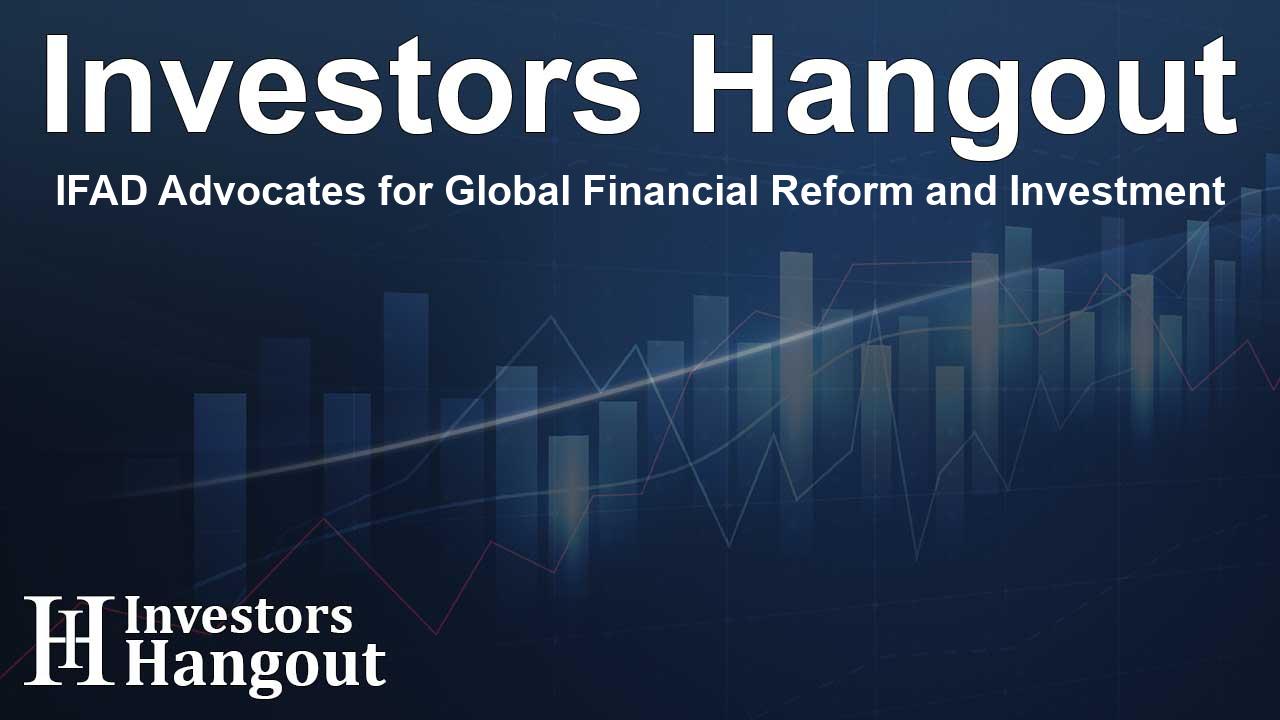IFAD Advocates for Global Financial Reform and Investment

Transforming the Landscape: A Call for Financial Reform
In light of pressing global challenges like hunger, debt, and climate change, leaders are urged to take definitive action. Alvaro Lario, President of the UN's International Fund for Agricultural Development (IFAD), made a compelling appeal at a significant summit addressing the future of our planet. His message was clear: the lack of financial resources isn't the primary issue holding back progress; rather, it's the political will to allocate investments where they're needed most.
Political Will: The Keystone for Change
Lario emphasized that reforming the global financial architecture is critical for substantial investments aimed at climate adaptation and transforming food systems. It's about fostering fairness and efficiency in these investments to secure a thriving future for all. The strength to fight hunger effectively is enhanced when there is a collaborative approach towards sharing wealth and resources among nations.
Investment in Rural Areas
He poignantly noted that over 3 billion people living in rural areas face severe challenges, particularly in terms of poverty and food insecurity. Small-scale farmers, who play a crucial role in the global food supply by producing a significant portion of our food, require heightened financial support. These farmers are the backbone of food production, and investing in their infrastructure is vital for sustainable agricultural growth.
Maximizing Existing Resources
Lario highlighted an essential point: investments must be strategic. He stated, “Finance must flow to where it is needed most. The farm and the first mile are where we should be investing.” This includes enhancing infrastructure like rural roads, irrigation systems, and markets that bolster agricultural development and benefit local communities.
Closing the Funding Gap
Despite the critical nature of these issues, significant financing gaps persist, particularly for climate initiatives in rural areas. Wealthy nations spend an impressive US$630 billion annually on subsidy policies that often harm the environment and disadvantage poor farmers. IFAD advocates for redirecting these subsidies to endorse the production of healthy, accessible food.
Innovative Financial Solutions
To bridge funding gaps, IFAD is advocating for innovative financial strategies. Utilizing risk-sharing mechanisms and guarantees, they seek to attract private sector investments into rural communities and food systems. This integrated approach reflects a forward-thinking strategy to leverage financial resources effectively.
Interestingly, IFAD has achieved an impressive milestone as the first UN specialized agency to receive a credit rating and participate in sustainable bond issuance on capital markets. Through these efforts, they have successfully raised over US$646 million since 2022, attracting attention from pension funds and insurers eager to invest in a sustainable future.
Our Mission in Sustainable Development
IFAD stands unique among UN agencies and international financial institutions as it unites development finance efforts for achieving Sustainable Development Goals (SDG 1: No Poverty and SDG 2: Zero Hunger). Their focus is unwavering in supporting small-scale producers, enhancing their resilience, and improving livelihoods in rural settings.
Contacting IFAD
For those interested in learning more or getting involved, feel free to reach out to Alberto Trillo Barca, Communication Officer. He can provide insights and support regarding IFAD's mission and how to help in these global challenges.
Frequently Asked Questions
What is IFAD's primary mission?
IFAD's main mission is to alleviate poverty and hunger by providing support for small-scale farmers and improving agricultural sustainability.
How does IFAD propose to improve investment in agriculture?
IFAD seeks to reform global financial systems, focusing investments on rural infrastructure and small-scale farming to address food security.
Why is political determination important according to IFAD?
Political determination is crucial for mobilizing investments and ensuring that resources are allocated to address the pressing issues of poverty and hunger globally.
What innovative financial strategies does IFAD employ?
IFAD utilizes risk-sharing mechanisms and guarantees to attract private sector investments into rural areas and food systems.
How can individuals support IFAD’s goals?
Individuals can support IFAD by spreading awareness, participating in discussions about food security, and potentially investing in initiatives aligned with IFAD's mission.
About Investors Hangout
Investors Hangout is a leading online stock forum for financial discussion and learning, offering a wide range of free tools and resources. It draws in traders of all levels, who exchange market knowledge, investigate trading tactics, and keep an eye on industry developments in real time. Featuring financial articles, stock message boards, quotes, charts, company profiles, and live news updates. Through cooperative learning and a wealth of informational resources, it helps users from novices creating their first portfolios to experts honing their techniques. Join Investors Hangout today: https://investorshangout.com/
Disclaimer: The content of this article is solely for general informational purposes only; it does not represent legal, financial, or investment advice. Investors Hangout does not offer financial advice; the author is not a licensed financial advisor. Consult a qualified advisor before making any financial or investment decisions based on this article. The author's interpretation of publicly available data shapes the opinions presented here; as a result, they should not be taken as advice to purchase, sell, or hold any securities mentioned or any other investments. The author does not guarantee the accuracy, completeness, or timeliness of any material, providing it "as is." Information and market conditions may change; past performance is not indicative of future outcomes. If any of the material offered here is inaccurate, please contact us for corrections.